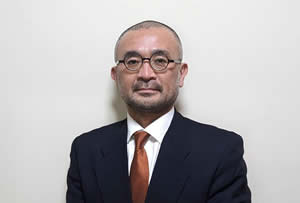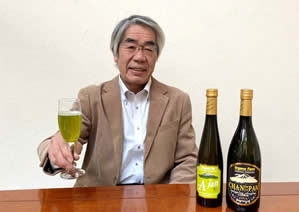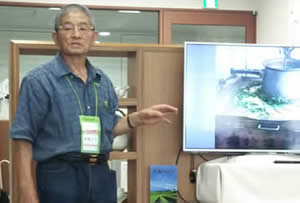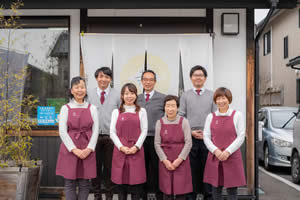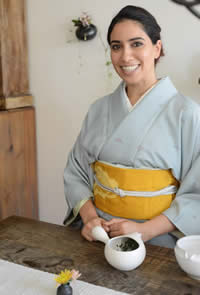Main content starts here.
Winners of O-CHA Pioneer Award 2023
Academic Research Award
Excellent academic research related to tea
ARAKI Takuya
(Department of Business Development, National Agriculture and Food Research Organization (NARO))
Development of energy-efficient control technology for tea field anti-frost fans
The award recipient developed a control method that activates based on the difference in temperature at the height of the anti-frost fan and near the crowns of the tea plants. This makes the fans run more efficiently, thus reducing production costs while remaining just as effective as anti-frost fans with conventional controls. The technology shows promise to be expanded beyond anti-frost fans. It can potentially be used to contribute to the prevention of global warming, establishment of sustainable agriculture, and to Japan’s Green Food System by applying the technology to other crops.
Industrial Technology Award
Development of excellent technologies and products related to tea production and consumption
MATSUSHITA Yoshiharu
(Matsushita Tea Garden / President)
Inovative organic tea production approach and product development that leads to generating new demand
An early adopter of organic farming, Matsuhita Yoshiharu established organic farming technology. Focusing on making great tasting tea, he was the first organic tea grower to receive the top prize in the fukamushicha category of the 75th National Tea Competition. Matsushita also proposes ways to enjoy tea through cafes and product development that lead to generating new demand. He continues to take on new challenges — such as opening the tea cafe Tea Time Maruha and developing the sparkling green tea liqueur Chanpan — and we look forward to further innovations from him.
Culture and Arts Award
Outstanding achievements in tha culture and arts
Robert HELLYER
(Wake Forest University / Professor)
Research on the history of tea trade between Japan and the US based on the countries' historical materials
Robert Hellyer presented a new approach for researching the history of the Japanese tea industry by showing the importance of examining the historical materials of the tea importers as well. For example, he showed that it was US tea merchants who built the Japan Tea brand outside Japan. He also shed light on the relationship between the history of racial prejudice in the US and the acceptance of Japanese tea, and on the impact exporting Japanese tea to the US had on green tea consumption in Japan in the early Showa era (1926 - 1945). He worked with many Japan studies experts in the US and Japan, and offered many suggestions for future Japanese tea research.
O-CHA Special Award
Excellent global achievements related to tea and the contribution of spreading Japanese tea
MURAMATSU Niroku
(Black tea producer)
Efforts to train producers, increase consumption, and promote the region through his superior black tea production techniques
Muramatsu Niroku began full-scale black tea production in 1989 while preserving tea plants grown by Tada Motokichi in the Mariko area of Shizuoka prefecture. He grew organic Assam tea, and was the first private-sector business to adopt the Benifuki cultivar in 1996. After much effort, he began selling black tea under the name Mariko Kocha in 1991. It grew into the most prominent Japanese black tea brand. Since then he has made his production technology freely available to all black tea producers who ask, and has worked to train producers, increase consumption, and activate the region. He is a true legend in the early years of Japanese black tea production.
CHAllenge Award
Ambitious efforts to drive the future of tea
HINO Ayaka
( Manager of Tohoku Kitaha Planning and Development Office, Farm Soleil Y.K.)
Contribution to new tea culture in Tohoku
Hino Ayaka started developing Japanese black tea in 2014 out of the desire to do something for the next generation that would benefit the Tohoku region after the Great East Japan Earthquake. In 2017, she started selling Kitaha, the first Japanese black tea in the Tohoku region, made with Mono-cha tea from Ishinomaki. It was placed on the menu for the dinner served to world leaders at the 2019 G20 Osaka summit. Since then, she built a new factory that handles everything from raw material production to productization in Ishinomaki. Thanks to her vibrant activities, we expect tea culture to spread from Tohoku.
Budoor STEELE
(Chawan Japanese Tea House / Founder)
Introduction of Japanese tea, the tea ceremony, and Japanese culture to the Middle East
Budoor Steele is the founder of Chawan Japanese Tea House in Bahrain. The tea house supplies Japanese tea to 31 cafes and restaurants in the Middle East. Besides selling tea, her endeavors include teaching customers how to prepare tea and about tea etiquette, and developing tea and dessert pairing menus. She holds workshops and tea gatherings for Japanese tea in different countries with a focus on the Middle East to promote the appeal of Japanese culture and tea. She is also the first certified Urasenke tea ceremony instructor in Bahrain. We look forward to her leveraging her abilities to continue conveying the appeal of Japanese tea worldwide.

